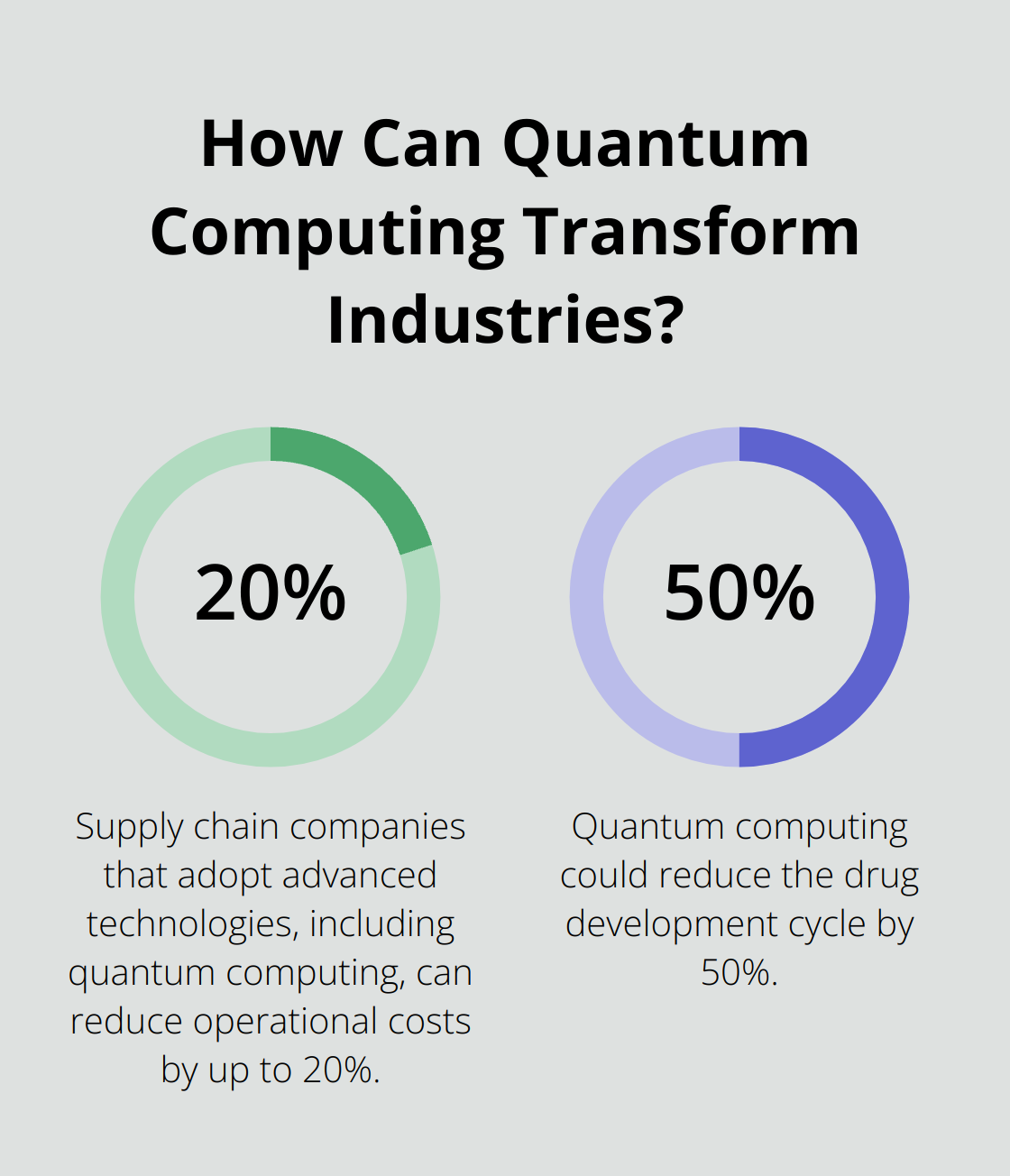
The Various Applications of Quantum Computing
Quantum computing is revolutionizing many sectors, shaking up traditional methods with its immense processing power.
We at Shirikihub are excited to explore how businesses and researchers are harnessing this technology.
Our blog post covers current breakthroughs, limitations, and future prospects in quantum computing.
How Is Quantum Computing Used in Business?
Quantum computing is gradually reshaping various business sectors with its unparalleled processing power. Companies that effectively utilize this technology are already seeing significant benefits.
Financial Modeling and Risk Management
Quantum computing is a game-changer in finance. Traditional financial models can be insufficient for handling complex data. For example, J.P. Morgan Chase has leveraged quantum algorithms to speed up Monte Carlo simulations, significantly reducing the computation time required for assessing risk and pricing derivatives. McKinsey estimates that the impact of quantum computing on the financial sector could reach billions by 2030. Businesses can use quantum computing to achieve more precise risk models, enhance portfolio management, and optimize trading strategies, thereby gaining a competitive edge. Firms should invest in partnerships with quantum computing research centers to develop customized financial models that outperform traditional methods.
Supply Chain and Logistics Optimization
The logistics and supply chain industry can greatly benefit from quantum computing’s optimization capabilities. Companies like Volkswagen have collaborated with D-Wave to optimize traffic flow using quantum algorithms, reducing congestion and improving efficiency. Quantum computing can handle vast datasets to find optimal routes, manage inventory in real-time, and enhance warehouse operations. According to a report, supply chain companies that adopt advanced technologies, including quantum computing, can reduce operational costs by up to 20%. Businesses should prioritize incorporating quantum computing into their logistics operations to streamline processes and cut costs. Investing in quantum expertise and technology will yield better asset utilization and faster delivery times.
Drug Discovery and Development
In the pharmaceutical industry, quantum computing is helping to accelerate drug discovery and development. Traditional drug discovery methods are often time-consuming and costly. Companies like ProteinQure are using quantum simulations to model molecular interactions, leading to faster identification of potential drug candidates. This technology can process millions of combinations, drastically reducing the time from discovery to market. Recent studies indicate that quantum computing could reduce the drug development cycle by 50%, significantly lowering costs. Pharmaceutical firms should explore collaborations with quantum computing experts to enhance their R&D processes. Integrating quantum computing can lead to quicker drug discoveries and more efficient testing, resulting in life-saving treatments reaching patients faster.

Quantum computing is not just a theoretical field—it’s delivering real-world benefits in various industries. Embracing this technology could lead to groundbreaking advancements and efficiencies that were previously unimaginable. For more insights into related technological advancements, check out our guide on digital infrastructure optimization.
How Does Quantum Computing Aid Scientific Research?
Material Science and Chemistry Advancements
Quantum computing is revolutionizing material science and chemistry. Simulating molecular and material behaviors with traditional computers is slow and limited. Quantum computers, however, can quickly solve complex equations governing atomic interactions, leading to more accurate predictions. For instance, understanding high-temperature superconductors or creating new materials with specific properties becomes feasible. Companies like IBM and Google are investing heavily in this area, expecting to accelerate discoveries in materials essential for various industries, including electronics and renewable energy. By partnering with quantum research institutions, companies can tap into this technology, potentially cutting research timelines in half.
Breakthroughs in Cryptography and Cybersecurity
Cryptography and cybersecurity stand to gain immensely from quantum computing. Quantum algorithms can factorize large numbers exponentially faster than classical algorithms, rendering current encryption methods vulnerable. The urgency for quantum-resistant algorithms is paramount. Post-Quantum and other leaders are developing encryption techniques that can withstand quantum attacks. Organizations must invest in these quantum-safe solutions now to protect future data. Moreover, innovative quantum key distribution methods ensure secure communication channels. Adopting these advanced cybersecurity measures will be crucial for maintaining data integrity and confidentiality in the coming years.
Enhancing Climate Modeling and Environmental Studies
Quantum computing offers unparalleled capabilities in climate modeling and environmental studies. Traditional climate models struggle with the sheer complexity of variables involved. With quantum processing, simulations that once took years can be completed in days. This capability allows for more accurate predictions of climate patterns and more effective solutions for mitigating climate change effects. Quantum computing could play a vital role in renewable energy optimization, enhancing the efficiency of solar panels and wind turbines. Collaboration between environmental scientists and quantum computing experts is essential to harness these benefits, ensuring better resource management and sustainability.

For those interested in further exploration of technological advancements, check out our insights into the environmental impact of digital tech.
By leveraging quantum computing, industries can make significant strides in their respective fields, driving both innovation and efficiency.
What Are the Current Challenges and Future Possibilities?
Scalability and Error Rates
Quantum computing, despite its potential, faces significant hurdles in achieving widespread adoption. Scalability remains one of the major challenges. Current quantum computers are far from reaching the million-qubit mark necessary for solving highly complex problems. Most quantum systems today operate with fewer than 100 qubits. For example, IBM’s latest quantum computer has 127 qubits. However, achieving fault-tolerant quantum computing requires millions of error-free qubits, a milestone yet to be achieved.

Error rates also pose a significant issue. Quantum bits, or qubits, are notoriously delicate, easily disturbed by external factors such as heat and electromagnetic fields. This leads to high error rates, compromising the reliability of computations. Error correction techniques, while improving, are still in their infancy. Research in this area is crucial, with companies like Microsoft making progress in error-checking methods without disrupting quantum operations.
Specialized Hardware Requirements
The requirement for specialized hardware to maintain the supercooled environments necessary for quantum computing adds another layer of complexity. Quantum computers operate at temperatures close to absolute zero (-273°C) to ensure qubit stability. This necessitates sophisticated cooling systems and substantial infrastructure costs. The technology needs to evolve beyond these constraints to become commercially viable. Companies are exploring diverse architectures, such as superconducting qubits, photonic qubits, and trapped-ion qubits, each with their own hardware demands and scalability issues.
Investments in infrastructure are critical for future advancements. For instance, initiatives in developing smaller and more efficient cryostats could reduce costs and facilitate broader adoption.
Future Prospects and Commercial Outlook
The future of quantum computing looks promising, with market projections reflecting growing optimism. According to industry reports, the quantum computing market is expected to reach USD 949 million by 2025 with a compound annual growth rate (CAGR) of 30%. Key players like Google, IBM, and Intel are spearheading research and development, inching closer to practical quantum applications.
The focus for commercial availability is on creating hybrid quantum-classical systems, allowing businesses to leverage the strengths of both quantum and traditional computing. Early adopters in finance, logistics, and pharmaceuticals are starting to see the benefits, but full-scale deployment is still a few years away. Collaboration between companies and quantum researchers is vital to overcoming current limitations.
As advancements continue, it’s essential for businesses to stay informed and prepare to integrate quantum computing into their operations. For more insights on related topics, explore our guide on quantum-enhanced cybersecurity.
Ensuring preparedness for the quantum computing revolution can position companies advantageously in a rapidly evolving technological landscape. Despite current challenges, the potential benefits of quantum computing make it an area worth watching closely.
Conclusion
Quantum computing is already making its mark across various industries. From J.P. Morgan Chase’s advanced financial modeling to Volkswagen’s optimized logistics operations and ProteinQure’s accelerated drug discovery, the practical applications are both diverse and impactful. These real-world examples highlight the technology’s potential to solve complex problems faster and more efficiently than traditional methods.

Despite its promise, quantum computing faces challenges. Scalability is a significant hurdle, with current systems operating well below the million-qubit level needed for widespread, high-complexity applications. Error rates remain high, requiring sophisticated correction techniques and advanced hardware to maintain the necessary supercooled environments. Yet, continuous research and investment are driving progress.
The market outlook is promising, with the quantum computing sector projected to surpass USD 949 million by 2025. Early adopters in finance, logistics, and pharmaceuticals are beginning to see the benefits, but the journey towards full-scale deployment continues. Collaboration between businesses and research institutions is key to overcoming obstacles and unlocking the full potential of quantum technology.
For businesses looking to stay ahead, keeping abreast of advancements in AI-powered solutions and quantum-enhanced cybersecurity is essential. Transform your business with ARED’s innovative solutions like Smart WiFi and Shiriki Cloud. Join our partner program and be part of the future of distributed digital infrastructure.
Continuing to invest in quantum research and infrastructure will position industries to leverage the transformative power of quantum computing, ensuring they remain at the forefront of technological innovation.


